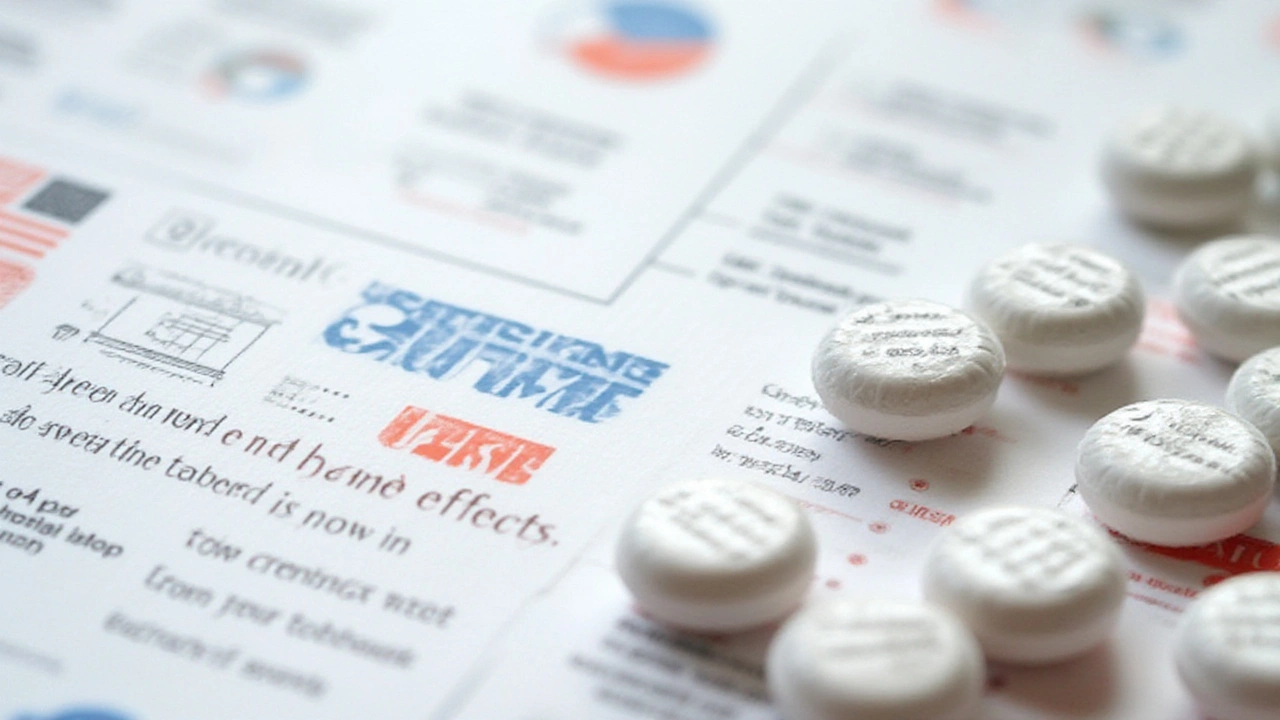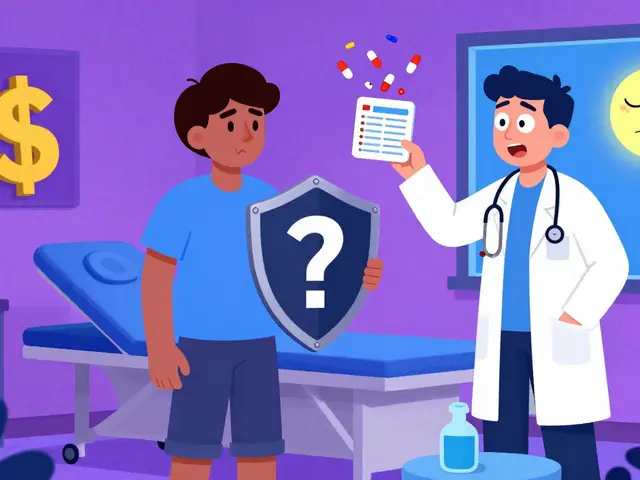Ask around, and almost everyone has battled an allergy at least once—runny nose, itchy eyes, or sneezing fits that make you want to hide under the covers. There’s no shortage of pills that claim to fix these symptoms, but some do the job with fewer drowsy days and foggy brains. That’s where levocetirizine steps in. It’s not some new kid on the block, but it’s managed to stand out for how quickly it calms allergy chaos, often without knocking you out. If you’re after answers about what exactly it does, why doctors reach for it, and whether it’s actually worth a spot in your medicine cabinet, you’re in the right place.
How Levocetirizine Works and What Makes It Different
This little white tablet has a pretty straightforward mission: block the effects of histamine, which is the sneaky chemical behind most sneezes, welts, and itch attacks. Unlike old-school antihistamines—think diphenhydramine or chlorpheniramine, which can leave you groggy—levocetirizine belongs to the so-called “second-generation” family, where the main brag is powerful symptom relief with barely any drowsiness. If you’ve ever been stuck in a meeting or had to drive right after taking something for your allergies, you know how priceless that is.
Levocetirizine is the active R-enantiomer of cetirizine, which basically means it’s the ‘mirror image’ part that really works its magic. Drug makers figured out you can skip the part of cetirizine that doesn’t do much, and double down on the effective half. This clever hack results in equal—and sometimes even greater—allergy-busting power at lower doses. No surprise it became a go-to recommendation for chronic urticaria (fancy term for hives that just won’t quit), hay fever, and sometimes allergic skin rashes or even itchy eczema.
There’s a reason why levocetirizine sits comfortably inside so many backpacks and bathroom cabinets. It gets absorbed in about an hour, which means relief can kick in during your lunch break or before your favorite show ends. It also sticks around in your body for a solid 24 hours, so you only need to take it once a day—that’s one less thing to remember before bed.
Curious how it compares in actual studies? A 2022 review in the International Journal of General Medicine put levocetirizine head-to-head with other antihistamines and found that, in groups with chronic hives, it matched or outperformed the competition on itch control and skin clearing. And here’s something handy for anyone with food allergies or asthma: because levocetirizine doesn’t mess much with your heart rhythm or blood pressure, it gets an extra nod of approval for folks who are medically complicated or on multiple meds.

Clinical Uses, Dosing, and What to Expect
So, what brings people to levocetirizine? The most common reason is allergic rhinitis—which might sound silly, but we’re talking about more than just a seasonal sniffle. We're talking endless sneezing, a nose that leaks worse than a faulty pipe, and itchy eyes that ruin your day. Chronic idiopathic urticaria is another reason. This isn’t your regular mosquito bite rash; it’s more like angry red welts that show up for no reason and refuse to leave. Levocetirizine gets the call here because it dials down allergic irritation at the source.
Now onto the nuts and bolts: typical dosing for adults and teenagers is one 5mg tablet each evening, though doctors might tweak that for certain cases. Kids aged 6 and older often get half the dose, while it’s used cautiously and with lower doses in kids as young as 2 for specific allergies. You don’t have to stick to evening, but many do, since it lines up with the body’s natural histamine surge at night. Want to take it with breakfast? That’s fine—food doesn’t really change how your body handles it. For anyone who hates swallowing tablets, liquid forms are also out there.
Here’s a pro tip: Drinking plenty of water with your dose helps move things along faster. Also, skipping a dose won’t turn you into a sneeze machine immediately, thanks to its long half-life, but if you forget for a couple of days, those allergies will definitely remind you. If you’re planning a vacation where pollen or dust mites will be waiting, it’s worth starting levocetirizine a few days early to get ahead of symptoms.
Let’s peek at some real data for how well levocetirizine holds up:
| Condition | Relief Rate | Common Dosage | Notes |
|---|---|---|---|
| Allergic Rhinitis | 82% report better symptoms within 1 week | 5mg once daily | Improvement often seen within 2 hours |
| Chronic Urticaria | 76% clear or nearly clear by 4 weeks | 5mg once daily (up to 10mg in tough cases) | Safe for long-term use |
| Seasonal Allergy Prevention | 79% fewer severe attacks reported | 5mg once daily | Start 3-5 days before allergen exposure |
Levocetirizine doesn’t become less effective if you use it for months in a row, which sets it apart from some older allergy meds that lose their punch. And you can pair it with nasal steroids, decongestants, or even asthma inhalers without trouble (just always run combos by your doctor, because everyone’s got their own health puzzle).

Safety, Side Effects, and Common Questions
So here’s the million-dollar question: Will levocetirizine make you sleepy, dizzy, or jittery like those old antihistamines? For most healthy adults, the answer is no. Studies show sedation is rare—about the same as a sugar pill—though a small slice of people (particularly those extra sensitive to meds) might notice a tiny drop in alertness. If operating machinery or driving is part of your daily gig, do yourself a favor and see how you respond on a quiet weekend first.
Another common worry is mixing levocetirizine with alcohol or coffee. Moderation is the key word—your reaction will vary based on your unique chemistry, but the odds of a bad combo are super low compared with older allergy meds. Still, no shame in sticking to mocktails if you don’t want to risk it. And don’t be shy about telling your doctor what else you’re taking; certain kidney disorders mean you’ll need a smaller dose, as the drug leaves your body a bit slower in these cases.
Keeps tabs on side effects? Here’s the breakdown:
- Dry mouth (think mild, not desert-level)
- Slight drowsiness (usually passes in a few days)
- Headache (reported by about 1 in 40 users)
- Rare stomach upset, mostly if taken without food in some folks
- Extremely rare: allergic reaction to the drug itself (hives, trouble breathing). If you spot this, get help fast
If you’re a parent, you’ll want to know that levocetirizine’s safety profile in kids is reassuring. A multi-country 2021 study in over 2600 children showed side effects were no more common than with placebo, and most were mild enough to go unnoticed. Still, every kid’s body is different—keep track of any new rash or unusual tiredness, just in case.
Got a job that calls for top-notch focus—pilots, heavy machine operators, or pro gamers? Most find they’re sharp and alert while using levocetirizine, but it won’t hurt to test it on a chill day before heading to work or tournament mode. One interesting tip: because it doesn’t cross the blood-brain barrier much, levocetirizine is less likely than many other antihistamines to mess with your REM sleep or memory.
Pregnancy and breastfeeding are always gray zones for any med. While levocetirizine hasn’t shown big dangers in studies, there still isn’t a mountain of data, so it sticks to ‘only if necessary’ territory for expecting or nursing moms—and always with a thumbs-up from a doctor.
Curious about cost? Levocetirizine is generic now, so even if you’re stuck with cash-only pharmacies, the price tag won’t bite too hard. You’ll also find it over the counter in most countries, but don’t let that trick you into thinking it’s suitable for everyone—including babies or people with serious kidney issues. The rule of thumb: when in doubt, check with someone who knows your case.
Here’s a hack for the sniffle-prone: Track when your allergies usually start (say, peak pollen in April or when the dog starts shedding extra) and set a calendar reminder. Taking your first dose a few days before your usual symptoms pop up can mean the difference between “just fine” and “stuffed like a turkey.”
Ever heard the myth that allergy meds ‘weaken your immune system’? Not true with levocetirizine. You won’t get more colds or infections from using it, since it only blocks histamine’s effects, not your actual body’s defenses. In fact, by calming inflammation, you might even sleep better—and scores of allergy sufferers swear their productivity spikes when they’re itch-free.
To wrap it up, levocetirizine checks a lot of boxes for people fighting allergies: fast action, barely any drowsiness, and reliable results that don’t fade out over time. There’s no one-size-fits-all—so talk it over with your doctor if you’re curious about making the switch. It might just bring you back to sniffle-free, itch-free living.







Comments
Calvin Smith
July 10, 2025 AT 00:17 AMAlright, let's cut the corporate fluff and get real about levocetirizine. This stuff's supposed to be the magic bullet for allergies, but honestly, how magic is it if you’re still sniffling after the first dose? I’m all for meds that do their job, but the side effects always throw a wrench in the gears.
Also, dosage? Pretty straightforward, right? Nope. The guide might have the numbers, but the real deal is knowing if you’re overdoing it or just wasting pills every day. Anyone else notice the dry mouth and wacky dreams? Because that’s where the theory meets reality and usually ends up in a mess.
Anyway, props for breaking down the clinical jargon – finally, a guide that doesn’t sound like it’s written by an alien scientist. But the real question: does levocetirizine deserve its rep or is it just another overhyped antihistamine?
Brenda Hampton
July 11, 2025 AT 22:22 PMThis guide is pretty detailed, but I’m curious about its usage for different age groups. Does anyone know how it affects kids compared to adults? I’m always cautious because what works for me might not be suitable for a little one.
Also, the bit about watching out for side effects made me wonder: what’s the most common adverse reaction people experience? I know allergies can be aggressive, but I want to avoid causing more trouble by using meds carelessly.
Would love some shared experiences here to get a fuller picture because clinical facts only paint half the portrait. The hands-on part is promising, but real stories always solidify trust.
Lara A.
July 13, 2025 AT 20:27 PMUgh, have y’all actually read the fine print on these so-called "safe" drugs?! Levocetirizine is just another means for Big Pharma to keep us docile while they rake in profits. There’s always a catch with these medications – mild side effects my ass! They conveniently downplay the long-term neurological impacts.
And do you really think this guide is unbiased? Spoiler alert: no chance. It’s all scripted to make you think you’re informed while they lull you into complacency. I’d be *very* skeptical before popping this pill like candy. Health is a complex web, and quick fixes are usually traps disguised as blessings.
Stay woke, people. Don’t let the mainstream narrative trick you into forgetting the bigger picture!!!
pooja shukla
July 15, 2025 AT 18:32 PMHonestly, I find a lot of nonsense about medications marketed as silver bullets. When it comes to levocetirizine, you have to ask yourself if you’re really getting the optimal treatment or just following a Western agenda blindly. Allergy treatments should factor in local contexts and traditions instead of forcing foreign chemical concoctions down our throats.
We need better regulations and awareness, especially in countries like India, where rampant misuse and overprescription lead to bigger health issues. I appreciate informative guides, but sometimes they just feed into the dependency cycle on pharmaceuticals.
People should educate themselves about alternative remedies as well, and pressure governments to cut out unnecessary intermediaries profiting from these drugs.
Poonam Mali
July 17, 2025 AT 16:37 PMThis guide sounds like a clinical script, but let’s talk about the pharmacoepidemiology and real-world pharmacovigilance data on levocetirizine. It’s not just about dosage and side effects superficially; understanding receptor affinity, off-target interactions, and long-term immunomodulatory consequences is crucial.
Plus, the frequency of adverse events needs statistical lenses beyond anecdotal experience to truly assess safety profiles. I’m skeptical that this guide covers these complexities in depth, despite its claim to be hands-on.
We should also scrutinize published data sources for potential funding bias that skews the interpretation of clinical outcomes. A truly comprehensive clinical guide demands this level of scrutiny.
Gayatri Potdar
July 19, 2025 AT 14:42 PMOh god, same here. Every time I take levocetirizine, I feel like I’m signing a pact with something much darker. Allergies might get better, but what about the brain fog and anxiety that follow? This guide tries to act all innocent but I smell the hidden agenda! We do not get full transparency from these pharmaceutical companies—never.
They want us caught in their trap, dependent on meds, while real healing gets pushed aside. The side effects are just the tip of the iceberg, and nobody talks about how it similarly affects immune balance and metabolism in forbidden ways.
Be careful, people. Do your homework beyond these nice clinical summaries.
Michael Waddington
July 21, 2025 AT 12:47 PMWhile some of you sound pretty off the mark with the conspiracy vibes, I do think it’s good to approach medications with balanced skepticism. Levocetirizine is widely used, and yeah, it’s generally effective, but it’s hardly perfect.
The practical stuff I want to highlight is how it interacts with other meds, especially in polypharmacy cases, common in older adults. The guide should have included more on drug-drug interactions and dose adjustments.
I appreciate clinical guides that don’t just list benefits but actively compare them with risks for varied patient profiles. That’s real value rather than just marketing fluff.
April Rios
July 23, 2025 AT 10:52 AMIt’s refreshing to see a guide that attempts to distill clinical data into accessible language. The challenge, though, is that levocetirizine is just one part of a broader treatment paradigm that includes lifestyle, environmental controls, and often complementary therapies.
The philosophical angle I’d add is that no medication can be a silver bullet, and relying solely on pharmaceuticals risks overlooking the body's holistic signals. Allergy sufferers often get trapped in a cycle of symptom management, missing opportunities for long-term balance.
Knowing the science is important, but equally vital is cultivating an awareness of how we as individuals interact with these medications on a deeper level. That’s the nuanced understanding this guide could evolve towards.
byron thierry
July 25, 2025 AT 08:57 AMFrom my perspective, levocetirizine represents a pharmaceutical advancement that balances efficacy with an acceptable safety profile, but as with all drugs, context is critical. The guide referenced here should be lauded for cutting through the esoteric medical lexicon that often alienates patients and even practitioners.
However, I would urge readers to consider this as just one part of informed consent, not the totality of clinical decision-making. Consultation with healthcare providers who can tailor treatment to individual comorbidities and patient histories remains vital.
Ultimately, this guide serves as a solid foundation, but not the definitive authority on levocetirizine's role in allergy management.
Calvin Smith
July 27, 2025 AT 07:02 AMJumping back in because some points made are pretty interesting. I appreciate the skepticism around pharma, but not everyone’s out to pull your strings. Sometimes, this stuff actually helps, especially when your allergy-induced misery is off the charts.
That said, anyone else notice that while clinical guides lay it all out, the day-to-day experience of taking these meds can feel like a gamble? Like, I took levocetirizine for weeks and it did the job mostly, but the brain fog was real. The guide should maybe have a stronger 'real world' user input section.
And yes, the dosing and age factor Brenda raised are legit questions. I guess the takeaway is: use guides like these as a starting point but listen to your body and doc too.